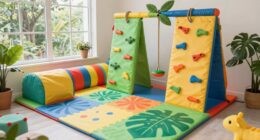A successful allowance model for tweens focuses on teaching basic financial skills like saving, budgeting, and responsible spending. By giving a set allowance and encouraging them to save a portion, you help build discipline and good habits early. Using simple budgeting strategies, they learn to prioritize needs over wants and manage money wisely. Continuing with this approach sets a strong foundation for future financial independence and success—there’s much more to discover about making this work effectively.
Key Takeaways
- Implement a consistent allowance system to teach saving, budgeting, and responsible spending habits early.
- Encourage tweens to allocate a portion of their allowance for savings to build discipline.
- Teach budgeting by helping them plan expenses and prioritize needs over wants.
- Use allowance as a practical tool to develop financial literacy and decision-making skills.
- Reinforce long-term benefits of good money habits to set a foundation for future financial success.

Have you ever wondered why understanding money matters early on? The sooner you grasp the basics, the better you can handle your finances as you grow. One of the most effective ways to start is by developing good saving habits and learning budgeting strategies. When you receive an allowance, it’s not just about spending; it’s an opportunity to practice managing money wisely. Setting aside a portion of your allowance for savings helps you build discipline and understand the importance of setting financial goals. For example, if you decide to save 20% of your weekly allowance, you’ll see how small savings add up over time, giving you the chance to buy something you really want later on. This habit encourages patience and helps you avoid impulsive spending, which can lead to unnecessary expenses.
Budgeting strategies become essential tools when managing your allowance. Think of a budget as a plan that guides how you spend and save your money. Start by listing your expenses—things like snacks, entertainment, or small toys—and compare that to your allowance. If you notice you’re spending too much on treats, you can adjust by cutting back and directing that extra money toward your savings. Creating a simple budget also teaches you to prioritize your needs over wants, a skill that’s vital as your financial responsibilities grow. It’s not about restricting yourself but learning how to make your money work for you. With practice, budgeting strategies become second nature, helping you make smarter choices and avoid debt or financial stress later in life. Developing a good understanding of financial literacy early on will set a strong foundation for future financial success.
Implementing these habits early on gives you a strong foundation for financial literacy. When you consistently save and plan your spending, you gain confidence in managing your money. Plus, you start understanding the value of money and the effort it takes to earn it. Having a clear picture of your finances allows you to make informed decisions about how to use your allowance, whether for short-term pleasures or long-term goals. Remember, the goal isn’t just to have money but to learn how to make it grow and work for you. Developing these skills now means you’ll be better prepared to handle bigger financial responsibilities in the future. So, embrace your allowance as a learning opportunity—practice your saving habits and refine your budgeting strategies, and you’ll be setting yourself up for financial success later on.

Mczxon Wooden Give Save Spend Money Saving Box for Kids, Money Coin Savings Piggy Bank Jar Box for Kid Safe Money Saver, Teach Children About Giving Saving Giving Money Piggy Box for Boys Girls, Black
❤️Save Spend Give Giggy Bank System: One piggy bank for boys or piggy bank for girls with 3…
As an affiliate, we earn on qualifying purchases.
As an affiliate, we earn on qualifying purchases.
Frequently Asked Questions
How Can I Motivate My Tween to Save Money Effectively?
To motivate your tween to save money effectively, start with clear goal setting that excites them. Use reward systems to celebrate milestones, making saving feel rewarding. Encourage them to track progress and reflect on how saving helps achieve their goals. This approach keeps them engaged and motivated, reinforcing positive habits. By combining goal setting with consistent rewards, your tween will develop a responsible attitude toward money and savings.
What Are Age-Appropriate Financial Lessons for Tweens?
Think of teaching financial lessons to your tween as planting seeds for their future. Age-appropriate financial lessons include understanding needs versus wants, saving a portion of their allowance, and setting simple goals. You can also introduce basic budgeting and the concept of earning money through chores. These lessons build a strong foundation, helping them develop healthy money habits that grow over time and prepare them for more complex financial decisions later on.
How Do I Handle Mistakes in My Child’s Allowance?
When your child makes a mistake with their allowance, you should focus on mistake correction by calmly explaining what went wrong. Encourage them to reflect and offer apology strategies to make amends. Use this as a teaching moment, emphasizing growth and responsibility. Show understanding and patience, helping them learn from their errors. This approach builds trust and teaches valuable lessons about handling money and accountability.
When Should I Start Teaching Investing to My Tween?
Ever wonder when’s the right time to introduce investing to your tween? Starting around age 10 to 12 aligns with their developing understanding of financial milestones and investment timing. You want to teach them responsible money management early, so they grasp how investments grow over time. By now, your child can handle basic concepts, making it the perfect moment to introduce simple investment ideas that build their financial confidence.
How Can I Make Financial Lessons Fun and Engaging?
To make financial lessons fun and engaging, you should incorporate interactive games and storytelling techniques. You can turn lessons into challenges or simulations that allow your tween to make real decisions and see outcomes. Using stories helps them relate to concepts, making lessons memorable. Keep lessons lively and involve your tween in active participation, so they stay interested and learn valuable skills without feeling bored.

Budget Planner and Monthly Bill Organizer – Financial Planner Organizer Budget Book with Sticker Sheets – Bill Tracker Notebook | Budgeting Book with Debt, Saving and Expense Trackers – A5
Budget Planner With Monthly Bill Organizer – This undated budget book includes 12 months of budgeting pages to…
As an affiliate, we earn on qualifying purchases.
As an affiliate, we earn on qualifying purchases.
Conclusion
Think of your allowance as a tiny seed—you nurture it with good habits, and it grows into a mighty tree of financial wisdom. Each dollar you earn and save is a drop of water, helping your skills flourish. As you tend to this garden of money, remember that patience and responsibility are the sunlight that makes everything thrive. Grow your financial literacy now, and watch your future blossom into endless possibilities.

Financial Literacy for Tweens: Help Your Pre-Teen Develop Essential Knowledge in Making Wise Financial Decisions Over a Lifetime
As an affiliate, we earn on qualifying purchases.
As an affiliate, we earn on qualifying purchases.

My Money Log Book For Kids: Money Ledger Book for Kids | Pocket Money Education for Allowance | saving account ledger for kids | Perfect size 6×9 inch, 110 Pages.
As an affiliate, we earn on qualifying purchases.
As an affiliate, we earn on qualifying purchases.










